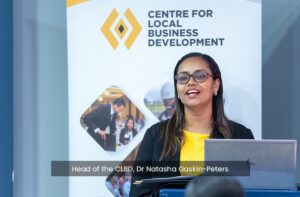
To support the substantial growth taking place across Guyana’s industries including agriculture, construction, and oil and gas, authorities must find at least 53,000 new workers. To bridge this labour gap, Director of the Centre for Local Business Development (CLBD), Dr. Natasha Gaskin-Peters said there are a multiplicity of positive outcomes to be had by harnessing the potential of women towards this cause.

During an interview on the Energy Perspectives Podcast, a programme powered by the Guyana Energy Conference and Supply Chain Expo, Dr. Gaskin-Peters acknowledged the government’s intention to import skills. To complement this approach, as well as other initiatives geared at upskilling the populace, she believes women ought to be targeted to help support the nation’s labour needs.
Expounding on the growing demand for labour, Dr. Gaskin-Peters shared that this subject was explored in depth via a 2023 study. That exercise was executed by the CLDB in collaboration with the University of Guyana (UG) and other agencies. It was funded by the Greater Guyana Initiative (GGI), a GY$20 Billion commitment (US $100 Million) by Stabroek Block partners, ExxonMobil, Hess and CNOOC, for capacity-building initiatives over a period of 10 years.
“That survey we did states that we need over 53,000 new workers and that is across only five sectors and there are 22 in the economy. So, there is definitely a need for importing skilled talent,” said Dr. Gaskin-Peters, adding that it was also one of the overarching recommendations in the 2023 study.
The report also urged authorities to establish a Labour Market Information System (LMIS) to improve data analysis; improve the quality of TVET courses for high-demand trades; and introduce one year pre-university bridging programmes in science and math to allow more students to qualify for degree programmes.
In addition to the foregoing, the CLBD Director stressed the need for authorities to implement policies that integrate more women into the workforce. To help women, particularly those with children, she said consideration can be given to policies on childcare while women tend to their jobs. “…Government has started some initiatives in training and childcare support services but broadening those would be ideal,” said the economist.
From the Centre’s perspective, she said support is offered through its AccelerateHer programme. This initiative offers participants the opportunity to learn the fundamentals of marketing and building their business.
“…This programme has really mentored women and I find sometimes women can be challenged as it pertains to their confidence and public speaking and that programme really helps them with how you pitch your business, how you market, and giving them that sense of aggression within the business community. You see these women flourish after the programme…,” the economist shared.
By leveraging the potential of women, Dr. Gaskin-Peters believes that the country can not only address labour shortages, but also promote gender equality while striving for a more inclusive and resilient economy.
